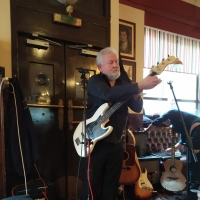AJB Interview with Bruce Scivally
 Barbel
ScotlandPosts: 37,856Chief of Staff
Barbel
ScotlandPosts: 37,856Chief of Staff
It's a fair assumption that most of us have DVDs or Blu-Rays of the Bond movies. The most recent versions have Special Features including documentaries such as, say, "Inside Octopussy"

or featurettes like "Silhouettes- The James Bond Titles"

and many more. Our guest is Bruce Scivally, who produced and/or wrote these (and many more besides)-
https://www.imdb.com/name/nm0778534/?ref_=tt_ov_wr
https://www.imdb.com/name/nm0778534/?ref_=tt_ov_wr
In addition, he's the co-author of a book many of us may have:

Please put your questions for Mr Scivally below.

or featurettes like "Silhouettes- The James Bond Titles"

and many more. Our guest is Bruce Scivally, who produced and/or wrote these (and many more besides)-
https://www.imdb.com/name/nm0778534/?ref_=tt_ov_wr
https://www.imdb.com/name/nm0778534/?ref_=tt_ov_wr
In addition, he's the co-author of a book many of us may have:

Please put your questions for Mr Scivally below.
Tagged:


Comments
Has the research and work gone into creating such a detailed tome as JB The Legacy caused you to change your opinions of any of the Bond films? For instance, maybe you’ve come to a greater appreciation of a film you previously didn’t rate highly.
Who was your most challenging Bond contributor to interview, either in tracking them down or conducting the interview itself?
Thanks Barbel!
Are available on YouTube.
What restrictions, if any, did Eon put on you and John Cork in making the documentaries?
1- Has the research and work gone into creating such a detailed tome as JB The Legacy caused you to change your opinions of any of the Bond films? For instance, maybe you’ve come to a greater appreciation of a film you previously didn’t rate highly.
What I discovered as we began to go through previous interviews with the creators of the films and conduct our own is that almost everyone connected with the early 007 films served in World War II and many had a background in intelligence, so they had an innate understanding of the world of Bond that went beyond just his conception as a filmic character – they had Bond in their bones, and I think that shows up on-screen. My opinion of the individual films didn’t change very much, except that I came to see how the films survived so well for so long because the character of 007 evolves and changes with the times, and each iteration of Bond is the appropriate one for the era in which the films are made. Although Bond is a formula character, and the films follow a formula, that formula is very plastic and malleable, which – I believe – is why we are still anticipating the next 007 film after nearly 60 years.
2- Are you aware if Eon is interested in continuing the "inside" documentaries for the rest of the films?
I’d certainly like to see it happen. If your readers want more “Inside” documentaries, they should please let MGM Home Entertainment and Eon know.
3- Who was your most challenging Bond contributor to interview, either in tracking them down or conducting the interview itself?
None of the people we ended up interviewing were particularly difficult to track down, and once we’d booked the interview, we found all of our subjects to be very cooperative and forthcoming. There were certain crew members and actors we tried to locate to no avail; it was a little more difficult in the days before practically everyone had a Facebook page. And there were some we really wanted to interview who, regrettably, were too ill to participate, like Charles Gray. But on the whole, I think we managed to get a very wide swath of actors and crew members from across the series, and certainly gathered enough information to present comprehensive narratives of the making of the films. FYI, I just posed this question to co-producer John Cork, who said: “The interviews were done by a wonderful team that ranged from David Naylor, our fellow producer, to numerous location producers, including Dave Worrall and Antonia Watson in the UK and various others around the world, and in every case, the important part was establishing trust with the interview subject. Because Bruce and I had such a deep knowledge of Bond and because we both valued research, we were able to talk to every potential interviewee in a way that honored their experience. We did have some folks who passed on interviews, including two Bonds: Sean Connery and Timothy Dalton, would-be Bond John Gavin, Ian Fleming’s friend Robert Harling, Claudine Auger, Mie Hama and Akiko Wakabayashi, Diana Rigg, Britt Ekland, and Barbara Bach. One interview that I regret not getting is Joanna Harwood, who was in France. She was willing, but we could not get a producer lined up to travel to her before our deadline. Fortunately, her wonderful story of working on the early Bond scripts is detailed in ‘Some Kind of Hero.’”
4- What restrictions, if any, did Eon put on you and John Cork in making the documentaries?
EON and MGM were both incredibly cooperative and respectful of our needs in the making of the documentaries. To the extent restrictions were placed on us, it was mostly to insure that we did not include opinions from our interview subjects that might paint themselves or others in a negative light.
5- What was the most unexpected or shocking behind-the-scenes anecdote that you uncovered in the process of researching and interviewing for the 'Inside' documentaries or James Bond: The Legacy?
I’d tell you but then I’d have to kill you. Seriously, if you watch the documentaries and listen to the audio commentaries, you’ll find almost every bit of interview material that we gathered.
Thanks to Bruce Scivally for his informative answers!
Once again thanks Barbel for organising these interviews, I’m really enjoying them! {[]